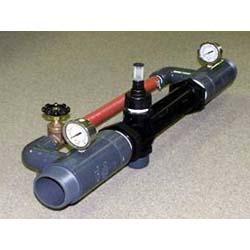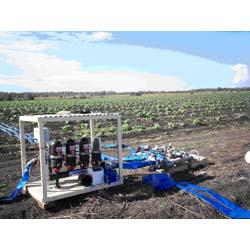BioFarm Agriculture supports Plant Sciences research
Published on 02 November, 2006
Oxygen deficiency (hypoxia) in the soil is one of the major bottlenecks for crop production when the soil is saturated, compacted and saline, especially in the heavy clay soil.
Aeration of the crop root zone can alleviate the problem associated with hypoxia and, therefore, improve plant performance.
CQU Plant Sciences Group has pioneered aeration of irrigation water and delivery of the aerated water to plants through subsurface drip irrigation (oxygation).
 PSG is a leader in oxygation research in the world. PSG\'s earlier research was focused on oxygation of crops under a controlled environment in the glasshouse and screenhouse.
PSG is a leader in oxygation research in the world. PSG\'s earlier research was focused on oxygation of crops under a controlled environment in the glasshouse and screenhouse.
With outstanding results from those controlled environment experiments and modeling, PSG is now extending its oxygation research in the field with industry partners for various crops around Central Queensland.
Aeration of irrigation water can be achieved by different methods. To date, PSG is largely relying on the Mazzei air injection system where a venture (air injectors) is used for mixing air with irrigation water.
\"We have been trialing these air injectors of different sizes (18-75 mm) to suit to different sized irrigation plots,\" says PSG Post Doctoral Research Fellow Dr Surya Bhattarai.
\"We have been working with different industries such as cotton, vegetable, and lucerne growers. We are working with farmers, agronomists, irrigation industries, government - Department of Natural Resources and Mines - and consultancy providers as well\".
Recently, BioFarm Agriculture (http://www.biofarmag.com.au) director and consultant, Mr Jeff Harvey, in recognition of PSG\'s significant innovation on oxygation, has donated PSG a 100mm size Mazzei air injector and all other required fittings/plumbing.
This air injector can deliver as much as 55 kL of irrigation water per hour, and the mixing of air can be achieved at different levels (up to 20% air by volume of water).
 This unit can, therefore, be utilized to irrigate about 20 acres of melons or pumpkin crop.
This unit can, therefore, be utilized to irrigate about 20 acres of melons or pumpkin crop.
\"This increased working relationship of PSG with local consultants will help for faster dissemination of novel oxygation technology for the industries,\" Dr Bhattarai said.
\"As we are receiving encouraging results form controlled and field experiments, now we are getting more and more enquiries and interest from growers and industries around Queensland as well as other states of Australia for the application of oxygation.
\"In the future, we will be extending our research on oxygation in cooperation with industries in a range of crops and soil environments\".
For more information, please contact Dr Bhattarai, 4923 2140, or Professor David Midmore 4930 9770.
Photo 1 (top): A field crop of pumpkins with and without oxygation at Alton Downs, Australia.
Photo 2 (bottom): A Mazzei model air injector.

